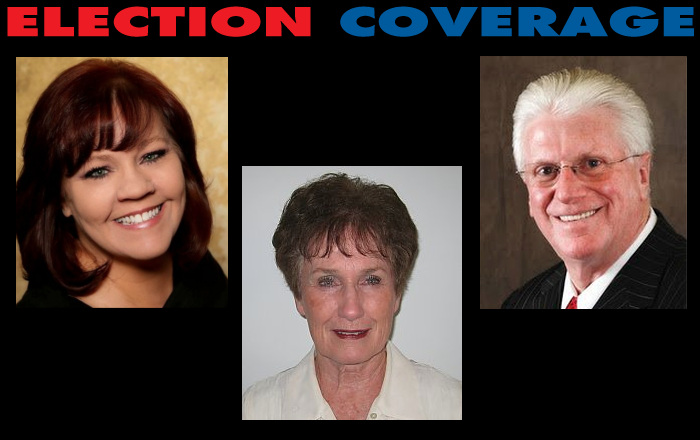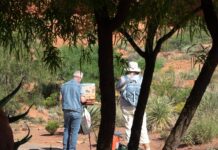
Written by Paul D. Dail
With less than a week until election day, candidates are making a final push to get their message out to voters. In Utah State House District 75, which roughly occupies the northwest corner of Washington County, including a large portion of St. George, three candidates are vying for the seat in the Utah House of Representatives.
Candidate snapshots
Don Ipson, the Republican incumbent, is seeking his fourth term. Ipson has served on several committees, including the Higher Education Appropriations Subcommittee, House Law Enforcement and Criminal Justice Committee, and State Water Development Commission. Born and raised in Panguitch, Ipson is the CEO of DATS Trucking. He is married and has four sons, three of whom are also involved in the family business.
Democratic challenger Cheryl Hawker is a fifth-generation St. George resident who has lived in southern Utah ever since her father retired from the military in 1975. In addition to her own business, she and her husband also run Hawker Enterprises, a general contracting company. She is married and has seven children.
Running for the Independent American Party, Nihla Judd was born in northern Utah but has been a resident of District 75’s Winchester Hills for 21 years. She is a seminary and institute teacher, as well as an instructor for a BYU adult religion classes. Judd is married and has five children.
Gov. Herbert’s Healthy Utah plan
Gov. Gary Herbert introduced his “Healthy Utah” plan in February as an alternative to the Medicaid expansion offered Affordable Care Act, which Utah rejected. Instead, Herbert’s plan would use money intended to expand Medicaid to instead provide state-funded subsidies to low-income residents who don’t currently qualify for Medicaid so they can buy their own health insurance.
Regarding Healthy Utah, Ipson said that he wants to wait and see what the final negotiations with the federal government will produce. One area Ipson is concerned about is whether the plan will support a “work requirement,” which will automatically enroll subsidy recipients with the Department of Workforce Services, or whether the plan will end up with an option for recipients to “opt-out” of this requirement.
“If [Herbert] gets the employment piece of the plan, it makes it more palatable,” Ipson said, “but I think it’s a ‘wait and see’ situation.”
Judd said that any programs administered are best administered at the lowest level possible, and that there is nothing in the Constitution providing for federally funded health care. She said that she opposes Herbert’s program on the same principals that led Herbert to reject the Medicare expansion in the first place.
“I feel like it’s wrong and opens the door into more federal intrusion into the state,” Judd said. “We don’t need any more federal dollars. We need to take care of our own state and be sovereign.”
Hawker said that she believes Medicare is a great program, but that it doesn’t do enough.
“Quite a few of our seniors weren’t able to provide for retirement,” Hawker said. “For us not to help them with their Medicare expenses is wrong. It is a civic duty.”
As to the Healthy Utah plan, Hawker pointed out that the money going to Medicaid is already coming out of Utahn’s paychecks, so there is no reason not to ensure that Utahns are benefiting from it.
“Honestly, I think [Gov. Herbert] is amazing, but I think [Healthy Utah expansion] is kind of a waste of money, creating new bureaucracies and using half the money just to figure out where he wants to spend the rest of it,” she said.
Anti-discrimination legislation
The recent U.S. Supreme Court decision not to hear Utah’s appeal case regarding same-sex marriage has opened the doors for Utah Sen. Steve Urquhart to reintroduce legislation that was tabled pending the Supreme Court’s final ruling.
Now that same-sex marriage has been deemed legal, the bill is back on the table. Urquhart’s proposed bill would ban discrimination in housing and employment, making it illegal to evict or fire someone based on sexual orientation or gender identity. When asked whether they would support such legislation, candidate answers varied.
Hawker said she would enthusiastically support the bill. She believes that such legislation would encourage people to become more tolerant, but expressed disappointment that the bill was even necessary.
“It’s too bad we still have to explain to people how to be kind to each other,” Hawker said. “I cannot comprehend the ability to be so mean and hateful and feel like you have to separate the world according to an obsession with what goes on behind closed doors.”
Although Judd said she hadn’t yet had the opportunity to read the bill in its entirety, she said that while she doesn’t support discrimination and believes that everyone has a right to employment, housing, and jobs, she feels that employers and landlords should also have a right to choose whom they will hire or have living on their property.
“My freedom stops where another person’s nose begins,” Judd said.
Ipson said that while he’s empathetic to members of the LGBT community who face discrimination, he doesn’t believe that such discrimination is a widespread problem in southern Utah.
“I think it’s a solution looking for a problem. I think it sets up a special class of people,” Ipson said. “I’m not in favor of the bill.”
The Lake Powell Pipeline
One of the most divisive issues facing Utah lawmakers is whether or not to go through with a a proposed project to build a high-capacity water pipeline from Lake Powell in northern Arizona to southern Utah for use in Washington and Kane Counties. Besides being an issue of water use and conservation, questions regarding the Lake Powell Pipeline also touch on issues regarding growth in Washington County.
Judd has several questions which she would like to see answered before the project goes forward, including questions about ownership of the property along the pipeline and whether some of those property owners recently purchased the land with advance knowledge that they could benefit from a sale in the future. She also would like to know if contractors are already involved and if promises have been made.
Regarding growth, she wonders if the majority of Washington County residents would prefer a smaller community. Primarily, Judd said she is concerned that the project will involve a lot of taxpayer money and investment. She believes it should be a voter issue.
“The whole burden of this expense will fall on the shoulders of the taxpayer,” Judd said, “so shouldn’t they have an opportunity to say whether or not they want this burden?”
Hawker is also concerned about the cost of the project, adding that she believes those who have been involved in government for a while recognize that the project will cost millions of dollars simply to maintain.
“With all of the other financial concerns we have to deal with, I’m pretty sure nobody is going to want to add more money out of their paychecks to pay for the pipeline,” Hawker said. She doesn’t believe the plan is necessary, and that monitored growth is the answer.
Complimenting the city officials for their due diligence regarding maintaining and monitoring the growth since concerns first arose in the 1980s, Hawker is willing to concede that something like the Lake Powell Pipeline may be necessary in the case of “extreme growth” in the future, but that she would like to see a final proposition on the project for review.
Ipson agrees that all the final preparations need to be completed before moving forward, including an environmental impact report which is still in the works, but says he is ultimately in favor of the Lake Powell Pipeline. He cites growth as his main reason for supporting the project.
“There is no question that we need [the pipeline],” Ipson said. “Otherwise, the growth is going to be stymied … The water has to come from somewhere.” However, even given his personal opinion, Ipson agrees that it should be a voter issue for approval.
Priorities
Each of the candidates running for the District 75 seat recognizes that any issue that is important to Utah citizens needs to be important to them, but when asked which issue(s) they consider priorities for their district, the answers varied.
Judd stated that she would like to continue her work toward repealing the 17th Amendment to the U.S. Constitution, which changed the way U.S. Senators were elected. Prior to the 17th Amendment, Senators were appointed by state legislators. Now Senators are elected by a popular vote, just like the rest of Congress. Judd sees this as an error that has stripped state governments of their representation in Congress.
“Over 100 years ago, senators used to represent states because they were appointed by the state legislature,” Judd said. “If they weren’t representing the state appropriately, the legislature could call them back.”
She said that senators now spend much of their time energy towards fundraising and appealing to the masses, rather than legislating in the state government’s best interest.
“That’s why all these issues come crashing down on us,” Judd said.
Ipson believes there are several issues that need to be addressed; however, he was able to come up with the top three that concerned him. “Not necessarily in this order, I would say education, transportation infrastructure, and the health care issues need to be resolved,” he said.
Hawker would agree on at least one of those issues. For her, education is the hub around which Washington County will continue to grow and develop.
“A good education base makes our area more desirable to companies looking to come here,” she said.
“Higher education creates graduates who are able to work for these companies which bring higher wages and good benefits packages, which means people spending more money locally, which creates revenue that can go back into our infrastructure.”
Each of the three candidates believes they have what it takes to lead Utah. For Ipson, he stated that his greatest qualifications come not only from his previous three terms and demonstrated leadership positions, but also the business experience he takes to the legislature.
“I have the respect of my colleagues,” Ipson said. “I am able to move legislation and get things done.”
Hawker said that her history in St. George and commitment to all of the communities in her district and Utah as a whole makes her the right choice to represent the district.
“St. George is extremely important to me … I may have been here for a long time, but I think change and progress are essential to our area,” she said.
For Judd, it’s important to her that voters know that she doesn’t believe she is competing against anyone. She doesn’t see herself as a politician running for office, but rather as a citizen who is running for the U.S. Constitution, the Bill of Rights, and the Declaration of Independence.
“I believe with all my heart that in order for America to return to her former greatness, we have to get back to [the] Founding Fathers’ principles. I am dedicated to voting for the Constitution 100 percent of the time.”
ELECTION COVERAGE




